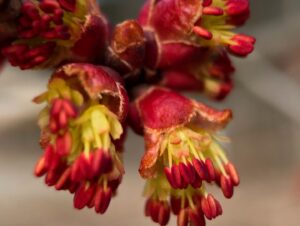Considering the Lilies
Scripture — Psalm 19:1-2 (NIV)
The heavens declare the glory of God;
the skies proclaim the work of his hands.
Day after day they pour forth speech;
night after night they reveal knowledge.
Focus
All creation reveals the Creator and the Creator’s glory. When we read Jesus’ exhortation to “consider the lilies” or “look at the birds of the air”, before jumping to the particular interpretation of such consideration that he drew in his Sermon on the Mount, we would do well to take time to actually consider the lilies—and also the mountains, trees, rivers, and clouds as well as the wild creatures of the skies, the hills, and the oceans.
Devotion
I continue to grow in my appreciation for the poetry, novels, and essays of Wendell Berry. His writings are artistically and spiritually rich. My favorite of his essays is “A Native Hill”. In one passage of that essay, he describes an experience coming upon a patch of bluebells strewn about the forest floor in the woods near his home:
In the cool sunlight and the lacy shadows of the spring woods the blueness of those flowers, their elegant shape, their delicate fresh scent kept me standing and looking. I found a rich delight in them that I cannot describe and that I will never forget. Though I had been familiar for years with most of the spring woods flowers, I had never seen these and had not known they grew here. Looking at them, I felt a strange loss and sorrow that I had never seen them before. But I was also exultant that I saw them now—that they were here.
Berry goes on to write about the joyful surprise that brought such rich delight, and also the loss and sorrow accompanying the delight: an awareness of being blessed and graced along with a simultaneous knowledge of evil and suffering. He concludes, “It is the privilege and the labor of the apprentice of creation to come with his imagination into the unimaginable, and with his speech into the unspeakable.”

In many ways, Wendell Berry was following a Biblical exhortation and example. In his Sermon on the Mount, Jesus exhorted listeners to pay attention to wildflowers—or, as the KJV translation says, to “consider the lilies” (Luke 12:27, Matthew 6:28). Earlier, he also told his followers to “look at the birds of the air” (Matthew 6:26). The lesson he drew from those examples is important: we do not need to worry. But sometimes I think we jump too quickly to that “lesson” and skip over the command to meditate on birds and flowers.
In the 19th Psalm, David noted poetically: “The heavens declare the glory of God; the skies proclaim the work of his hands. Day after day they pour forth speech; night after night they reveal knowledge.” Although he was writing about skies and celestial bodies, the principle is much broader: all creation reveals its Creator and the Creator’s glory. David was not the only one to point this out. Centuries later, the Apostle Paul wrote to the Roman church that visible creation reveals invisible attributes of God. That remains true for us today: “God’s invisible qualities—his eternal power and divine nature” can be “clearly seen . . . from what has been made” (Romans 1:20). One application of that principle jumps out at me: if we want to know the Creator, we should spend time meditating on creation. This sort of meditation acknowledges that God is a worker, and that we can see something of God’s character in God’s work.
And God’s handiwork—God’s creation which we often refer to as “nature”— does more than merely reveal knowledge about God; it can also impact us at a spiritual as well as intellectual level. In what we know as the 23rd Psalm, David writes about resting beside quiet waters and in green pastures—two types of experiences in nature—as being restorative to his soul.
The ancient Hebrew poet responsible for Psalm 104 seems to have understood all this and to have taken time to consider not only lilies and birds, but also mountains, trees, rivers, and clouds as well as wild creatures of the skies, hills, and oceans. This psalm alternates between observing creation and reflecting on the character or actions of God. In his responses to creation, the psalmist also praises the Creator.
Over my next several devotions—starting tomorrow—I plan to share a few of my own reflections on creation. Rather than my usual devotions focusing on God’s revelation through God’s written word, I will focus on God’s revelation through God’s created world. I don’t share these as definitive interpretations of what everybody ought to take from the same “scenes”, but simply my own thoughts as I seek to “consider the lilies.” My hope is that many readers will take the time to practice similar meditations along with me: in the language of Wendell Berry, that we will come as apprentices of creation, allowing our redemptive imaginations to listen to and reflect on the Creator. Although many of my reflections have come from times serving as an artist-in-residence in a national park or beautiful wilderness area, such reflections need not come from a scene of spectacular beauty; they can come from a backyard, city park, bird, thundercloud, or just two-foot-by-two-foot patch of soil. God’s handiwork is all around us, and we can deepen our knowledge of God by reflecting on that handiwork.
Reflect
When or how have you taken time to reflect on creation? If you have done so in recent memory, how have those times impacted you?
How do you think reflecting on creation can lead you to a deeper appreciation for, or knowledge of the Creator?
Act
Take some time to read Psalm 104. Make a list of all the aspects of creation that the psalmist reflects on. You might pray through the Psalm.
Prayer
Lord God, you have made the heavens and the earth. You have made all of its plants and all its creatures of the skies, the earth, and the waters. You have made canyons and rivers and oceans and mountains as well as the stars and the clouds. You are a great creator! I praise you. Help me to take the time to reflect on your creation. Point me to aspects of your creation that can inform, inspire, or restore me. Help me to see you at work in your work, even as my own work reflects something of who I am. Amen.
Find all Life for Leaders devotions here. Explore what the Bible has to say about work at the High Calling archive, hosted by the unique website of our partners, the Theology of Work Project. Reflection on today’s Life for Leaders theme can be found here: A Prayer That’s Not Just for the Pulpit.
Subscribe to Life for Leaders
Sign up to receive a Life for Leaders devotional each day in your inbox. It’s free to subscribe and you can unsubscribe at any time.

Matthew Dickerson
Author
Matthew Dickerson’s books include works of spiritual theology and Christian apologetics as well as historical fiction, fantasy literature, explorations of the writings of C.S. Lewis and J.R.R. Tolkien, and books about trout fishing, fly fishing, rivers, and ecology. His recent book,


